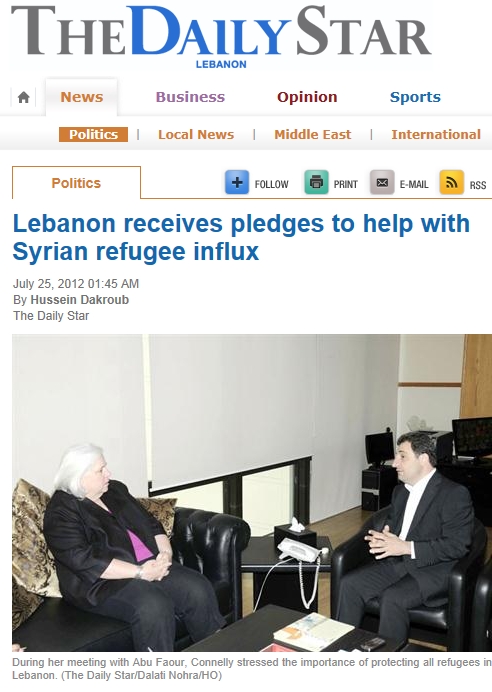
Lebanon: pledges to help with Syrian refugee influx
July 25 <The Daily Star>: Lebanon receives pledges to help with Syrian refugee influx
BEIRUT: The international community came forth Tuesday with pledges of assistance to the Lebanese government in meeting its humanitarian obligations toward thousands of Syrians displaced by the 16-month turmoil in their country.
The move came a day after Lebanon launched an appeal for financial aid to cope with a massive influx of Syrian refugees into the country,The announcement also followed U.S. and U.N. envoys’ meetings with Prime Minister Najib Mikati and Social Affairs Minister Wael Abu Faour.
The number of refugees soared dramatically last week after the killings of four high-ranking Syrian security officials in a huge bombing in Damascus.
The bombing and subsequent attacks launched by rebels in Damascus jolted the war-ravaged nation and prompted thousands of families to abandon the capital and flee the escalating violence for the safety of neighboring countries, including Lebanon.
Activists estimate the current number of Syrian refugees in Lebanon at around 90,000.
U.N. Special Coordinator for Lebanon Derek Plumbly discussed with Mikati the repercussions of the Syrian unrest on Lebanon, including helping thousands of Syrians who have taken refuge in Lebanon.
“I told the prime minister that [U.N. Security] Council members were concerned by the incidents along Lebanon’s borders with Syria and that they had stressed the importance of respect for Lebanon’s sovereignty and territorial integrity,” Plumbly told reporters after meeting Mikati at the Grand Serail.
“The Council members also emphasized their commitment and the commitment of the international community to Lebanon’s security and stability. In that regard, they appreciated the determination of Lebanon’s leaders to protect their country from the effects of the crisis in neighboring Syria and other regional developments.”
Plumbly, who has just returned from a visit to New York where he attended the Security Council session on the implementation of Resolution 1701, said he also relayed to Mikati “the international community’s commitment to continue supporting the Lebanese government in meeting its humanitarian obligations toward the thousands of displaced Syrians who have taken refuge in Lebanon.”
He added that Mikati met Monday with the United Nations High Commissioner for Refugees “to discuss ways of strengthening cooperation between the U.N. and the international community on one hand, and the government of Lebanon on the other in this field.”
Meanwhile, U.S. Ambassador to Lebanon Maura Connelly reiterated “the continuing U.S. commitment to providing aid to Syrian refugees and Lebanese societies hosting them,” according to a statement released by the U.S. Embassy in Beirut.
Connelly made the remarks following a meeting with Abu Faour, with whom she discussed the political and security situation in Lebanon and developments in Syria.
She welcomed “the generosity of the Lebanese people and the efforts made by the government in cooperation with international partners and organizations to provide humanitarian assistance to Syrians fleeing violence,” the statement said.
She also stressed the importance of protecting all refugees in Lebanon, including Syrian opposition figures and army deserters who have renounced violence, in line with Lebanon’s international humanitarian obligations.
She renewed the United States’ commitment to a stable, sovereign and independent Lebanon, the statement added.
Abou Faour also met with the Norwegian Ambassador to Lebanon Svein Aass, who expressed his country’s sympathy with the plight of Syrian refugees, saying the Norwegian government was ready to provide aid to the Lebanese state in this respect, the state-run National News Agency reported.
Praising the efforts of the Lebanese state and the Social Affairs Ministry to help Syrian refugees, Aass hoped that an agreement would be signed soon between the Lebanese and Norwegian governments to secure funds to the ministry to assist the refugees, NNA said.
Also, EU Ambassador Angelina Eichhorst said the European Union is willing to help the Lebanese government provide aid to Syrian refugees.
In an interview with As-Safir newspaper, Eichhorst said that the EU was studying means to contribute financially to the government’s refugee aid program, particularly after Mikati appealed for funding.
She said the EU’s involvement also comes after Abu Faour said that Lebanon needs $115 million to help the refugees.
Eichhorst said that during the EU foreign ministers’ meeting Monday, the participants praised Lebanon’s efforts in supporting those escaping violence in Syria and encouraged the government to continue its commitment in this regard. She added the EU has donated 3 million euros ($3.6 million) so far to Syrian refugees through U.N. offices and civil organizations.
The UNHCR said last week that up to 30,000 refugees arrived through Lebanon’s Masnaa border crossing in the east of the country over the span of two days.
The Local Coordinating Committee of Syria, which works in Lebanon to aid refugees and support the opposition, now estimates there are 90,000 refugees in the country. But it’s too early to tell exactly how many there are, where they are located and who needs help, LCC officials said.
But with Lebanon’s Higher Relief Committee facing shortages of funding and UNHCR reaching only a portion of the refugee population, government officials and aid workers have decided it’s clear that the country needs more funding to help.
Abou Faour said after meeting Mikati Monday that Lebanon would launch a round of contacts with Arab and international parties to muster financial support to help Syrian refugees. However, he stressed that a plan for spending was required.


